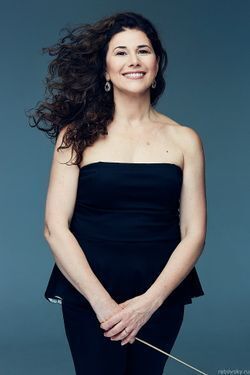
In 1993, Elena left Russia and arrived in the United States with a vision of expanding her opportunities in conducting. As a choir and orchestra director, university professor, and music editor, she brought innovative ideas that have impacted the students, artists, and audiences she has touched. Today, she is Artistic Director of Cantabile Youth Singers of Silicon Valley and Music Director of Symphony Silicon Valley Chorale.
Q: This is your third appearance with Seraphic Fire. What are you most excited about?
A: I’ve worked with quite a few professional choirs all over the world and there’s nothing like Seraphic Fire. These are my favorite people. They are as loving and kind and grateful as they are artistic and intelligent. Each one is a unique artist. Hands down, the most exciting proposition I ever received as a conductor was when Patrick Quigley said I could put together any program that I wanted. I went crazy. Because most everybody wants me to conduct only Russian music. The generation of female conductors ahead of me broke the mold by being “invited.” My generation is breaking the mold of women conducting only women.
Q: Your program, In Her Own Voice, features female composers and librettists; is this a program you had performed previously?
A: I have never done a program like this before. I am having the greatest time. I am like a kid in a candy shop discovering all these female composers that I didn’t know much about; some I had never listened to their music. In the beginning, I felt guilty that I had never done this work before. The more I dug, the more I realized the plethora of incredible musicians and the embarrassment of riches. I did not know there were so many. How is it that we are not singing their music all the time?
Q: How did you finally whittle down that long list to the pieces you absolutely felt you had to share with our audience?
A: I am such a sucker for really beautiful music; not just music that is sweet and calming. For me, beautiful means incredibly well composed; a piece that is aesthetically fantastic. For me, the music must speak even if I do not understand the words. For this program, I was looking for a combination of music and words that would be stunning.
Q: Can you translate what you mean by the program title: In Her Own Voice?
A: We are so used to hearing stories of women, the history of women, expressed by men, whether they are composers or lyricists. Don’t speak for us; we have our own words. What if we spoke in our own voice of how we feel and how we think? We want to hear the woman talk about how she feels, how she prays, how she cries, and how she breaks the rules.
Q: How do you hope that the artists grow from performing this music?
A: For some of our artists, a few of these composers will be completely new. Often, artists are asked to sing the same types of programs in the same style. In this program, they are asked to constantly switch gears. Storytelling is like a quilt. You look at it and say, “what a gorgeous thing.” All the pieces are different, but it’s the way they are stitched together. They complement each other. Instead of saying “oh, that’s weird,” one of the thrilling parts is how we are subjected to different centuries and from Iceland to Cuba. That’s a challenge and excitement!



